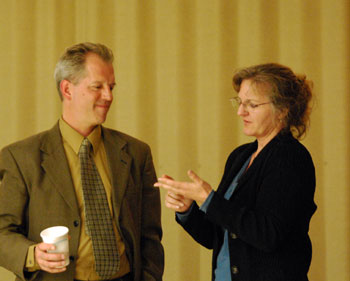Ann Arbor Looks to Future: Housing, Transit
Ann Arbor city council meeting (June 3, 2013): At a meeting that lasted until nearly 1 a.m., the council took major steps that will affect the future of services in two core areas: housing and transportation.

Stephen Kunselman (Ward 3) and Ann Arbor Housing Commission executive director Jennifer Hall. (Photos by the writer.)
On the housing side, a unanimous vote of the council approved the transfer of ownership for city properties managed by the Ann Arbor Housing Commission (AAHC) to the commission itself – an arrangement that’s actually more common across housing commissions in other cities. That step will allow conversion of the AAHC’s 355 public housing units to a project-based voucher system under HUD’s Rental Assistance Demonstration (RAD) program. AAHC will then be pursuing low-income housing tax credits through a ground lease of the properties to a private/public limited partnership. The tax credits are intended to fund several million dollars in needed capital improvements to the existing properties, as well as build 20-30 new units.
Other unanimous votes related to the AAHC’s plan included: a resolution to approve a payment in lieu of taxes (PILOT) for the properties now owned by AAHC – so that no property taxes will be owed; a resolution declaring that AAHC employees are and will remain city employees; and a $200,000 allocation from the city’s affordable housing trust fund to support improvements to Miller Manor.
On the transportation side, the council unanimously authorized membership of the city of Ypsilanti in the Ann Arbor Transportation Authority, by approving changes to the articles of incorporation for the AATA. The number of board seats is expanded from seven to nine, with one of the seats to be appointed by the city of Ypsilanti. The transportation authority will go by the name Ann Arbor Area Transportation Authority. The board of the AATA and the city of Ypsilanti also will need to formally approve the new articles, but are expected to do that in a straightforward fashion.
While the amendment of the articles of incorporation changes only the governance of the AAATA, the intent is to provide the potential for increased transportation funding. The AAATA could, with voter approval, levy a uniform millage on all member jurisdictions of the authority – now the cities of Ann Arbor and Ypsilanti. It’s a right the current AATA already has, but has never exercised. Each city itself already levies a transit millage, and transmits the proceeds of those taxes to the AATA. For Ypsilanti, the advantage of a transit authority millage is that it would not count against the state constitutional 20-mill cap that a city can levy – a cap that Ypsilanti has already reached.
Deliberations on those two agenda items – housing and transportation – did not begin until after 11 p.m.
Taking an hour of the council’s time before that was a debate on a change to the city’s public art ordinance. The council unanimously supported eliminating the requirement of an automatic 1% set-aside for public art in the budget for every capital project – known as Percent for Art. But lengthy deliberations unfolded about an additional change: A provision that would allow for the return of previous years’ public art allocations to their funds of origin.
The ordinance revision that had already been given initial approval by the council allowed for such a return just for the FY 2014 public art set-asides. In the end, the council opted for an ordinance change that did not provide for a return of previous years’ public art allocations. That leaves roughly $845,000 in funds that can be used for the public art program as defined in the revised ordinance – one that places the onus on city staff to identify capital improvement projects that might be suitable for incorporating public art.
Another significant item on the council’s June 3 agenda was a resolution encouraging the Ann Arbor Downtown Development Authority to allocate funding for three police officers. That resolution passed on an 8-2 vote. The council also gave final approval to utility rate increases (an annual item) and a reduction in utility improvement charges imposed on first-time connections.
Other business included final approval of rezoning requests for Parkway Place and State Street Center. The Parkway Place rezoning – at 490 Huron Parkway – was from R3 (townhouse dwelling district) to R1B (single-family dwelling district). The State Street Center rezoning, near the intersection of South State and Ellsworth, was from O (office district) to C3 (fringe commercial district).
In anticipation of the upcoming July 4 holiday, the council took initial action on an ordinance that would restrict use of fireworks to the hours of 8 a.m. to midnight.
During public commentary, the topic of Pizza in the Park was reprised as a theme from the council’s previous meeting. Advocates for the homeless community lobbied for a written commitment from the city that a parks and recreation fee would not be imposed on a church that distributes food and other aid at Liberty Plaza, a downtown city park. [Full Story]



